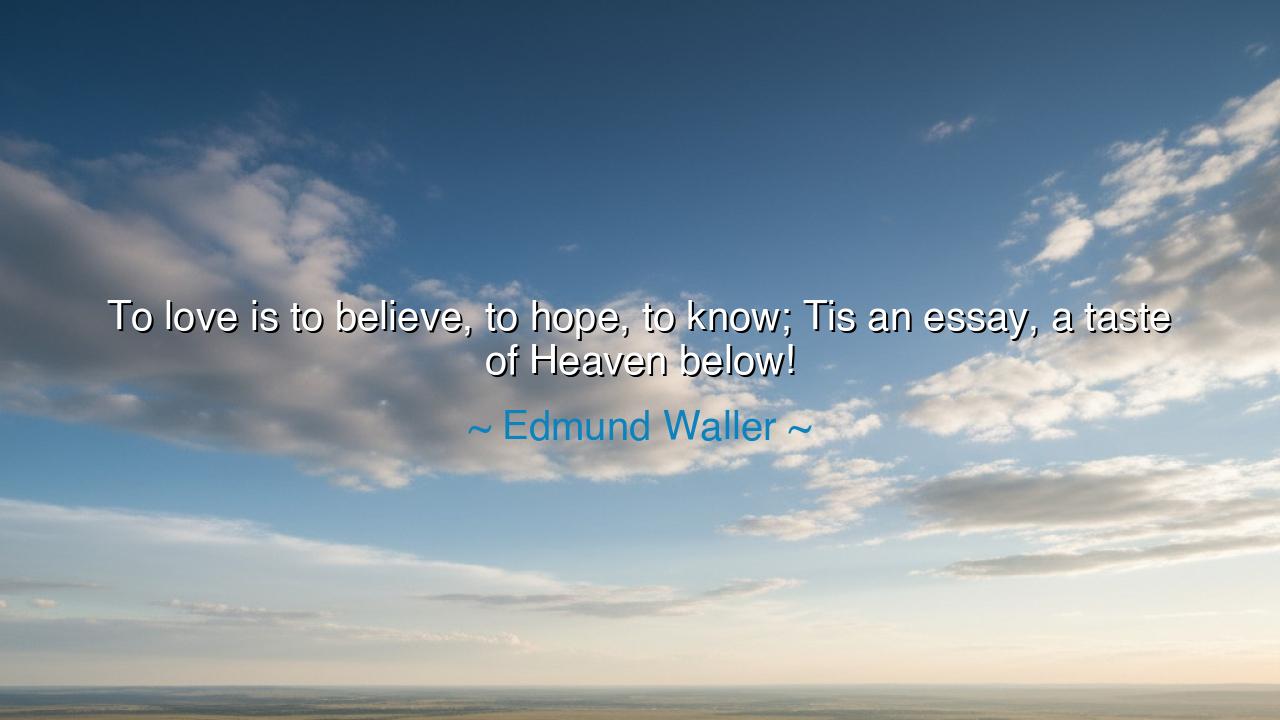
To love is to believe, to hope, to know; Tis an essay, a taste of






“To love is to believe, to hope, to know; ’Tis an essay, a taste of Heaven below!” Thus wrote Edmund Waller, the poet of the seventeenth century, whose words blended the grace of reason with the fire of emotion. In these lines, he lifts the veil on the mystery of love, describing it not as mere passion or desire, but as the reflection of the divine within the human heart. Love, he tells us, is faith, is hope, is knowledge—it is the essence of all that is eternal. And when we love truly, we are not bound to earth but raised to the threshold of Heaven itself, tasting for a fleeting moment the perfection of that celestial joy.
Waller lived in an age when poetry sought both beauty and truth, when art and philosophy met in the service of the soul. His words belong to that sacred lineage of thought which sees love as a spiritual ascent, not merely an emotion but a revelation. “To love is to believe,” he begins, for faith is the foundation of love: to love another is to trust in what cannot be proven, to give oneself to mystery. “To hope,” he continues, for love looks always toward the good, even amid suffering. “To know,” he concludes, for in the deepest love we know what reason alone cannot teach—that the soul is eternal, and that all goodness springs from the same divine source.
Thus, love is the essay of Heaven, the trial and foretaste of eternity. It is through love that mortals, bound in flesh, may touch the infinite. The poets and prophets of every age have known this truth. The ancients spoke of Eros and Agape, the twin flames of earthly and divine affection. Plato, in his Symposium, taught that through love of beauty we ascend from the love of one to the love of all, until we reach the contemplation of the divine itself. And in the Christian faith that shaped Waller’s world, God is love—not as metaphor, but as identity. When we love truly, we participate in the very being of God; when we give love, we share in creation’s sacred breath.
Consider the life of Mother Teresa, who walked among the poorest and most forsaken in the streets of Calcutta. Her love was not born of pleasure or ease, but of faith, of belief in the worth of every soul. In the sick and the dying she saw the image of the divine, and through her service she found a joy that the world could not understand. Her love was not romantic, but holy—the kind of love that Waller speaks of, a “taste of Heaven below.” For though she dwelt among suffering, her heart lived already in paradise.
The meaning of Waller’s words lies in this truth: love is not a transaction of feelings but a transformation of the soul. To love is to awaken—to see the world not through the eyes of fear or desire, but through the vision of eternity. It teaches us patience, compassion, and humility; it dissolves the boundaries between self and other. In love, we are taught that life’s purpose is not to possess, but to give; not to conquer, but to understand. To love is to trust in goodness even when the world is cruel—to believe in light though the night surrounds us.
Yet Waller also reminds us that this Heavenly essay is fleeting. The taste of Heaven we find in love is but a shadow of the eternal feast to come. Love on earth is imperfect, for we are imperfect—but its imperfections make it sacred. It teaches us forgiveness when we are wounded, strength when we are weary, and hope when all seems lost. In every act of love, whether toward a friend, a child, or a stranger, we polish the mirror of the soul until it reflects the divine more clearly. In this way, love becomes both our teacher and our destiny.
The lesson, then, is simple yet profound: love fully, believe deeply, hope endlessly. Let your love be more than a feeling—let it be a way of seeing. When you love, do so with courage, for love demands vulnerability; do so with faith, for love requires trust; do so with wisdom, for love is the path to knowledge. Each act of kindness, each sacrifice, each moment of forgiveness is a step toward Heaven, even while your feet still walk the earth.
So remember Waller’s words as a promise and a guide: “To love is to believe, to hope, to know.” Love is the bridge between what we are and what we may become. It is the seed of immortality planted in the soil of the human heart. Nurture it well, and you will find that even amid life’s trials, you dwell already in the outskirts of paradise. For to love, truly and selflessly, is to begin your eternity here and now—to taste, even in this mortal world, the sweetness of Heaven below.






AAdministratorAdministrator
Welcome, honored guests. Please leave a comment, we will respond soon